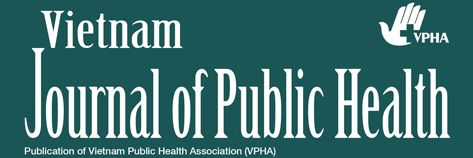Các chỉ số liên quan tới dinh dưỡng của bệnh nhân theo tình trạng dinh dưỡng tại Bệnh viện tỉnh Hải Dương (Differences of at risk indicators of malnutrition among patients by SGA groups at Hai Duong provincial General hospital)
Tóm tắt
Nội dung bài báo là một phần trong nghiên cứu "Thực trạng suy dinh dưỡng của bệnh nhân, hiểu biết, thái độ và thực hành chăm sóc dinh dưỡng của cán bộ y tế trong bệnh viện" tại bệnh viện đa khoa tỉnh Hải Dương. Bài báo trình bày kết quả nghiên cứu so sánh các chỉ số liên quan tới dinh dưỡng theo nhóm dinh dưỡng tốt và nhóm suy dinh dưỡng (SDD) bằng phương pháp đánh giá đối tượng toàn diện Subjective Global Assessment (SGA). Thiết kế nghiên cứu tiến cứu trên 280 bệnh nhân nhập viện trong vòng 48 giờ tại bệnh viện đa khoa tỉnh Hải Dương từ tháng 3-6/2009. Kết quả cho thấy các chỉ số liên quan tới nguy cơ dinh dưỡng của nhóm bệnh nhân SDD đều cao hơn so với bệnh nhân dinh dưỡng tốt: Tỷ lệ giảm cân >5% trong 6 tháng của bệnh nhân SDD là 52,9%, cao hơn so với tỷ lệ này ở bệnh nhân dinh dưỡng tốt (22,0%) (p < 0,001). Tỷ lệ bệnh nhân giảm khẩu phần ăn khi nhập viện ở nhóm bệnh nhân SDD là 51,2%, cao hơn so với tỷ lệ này ở nhóm bệnh nhân dinh dưỡng tốt (42,8%) (p < 0,001). Tỷ lệ bệnh nhân giảm chức năng vận động của nhóm bệnh nhân SDD là 55,4%, cao hơn so với tỷ lệ này ở nhóm bệnh nhân dinh dưỡng tốt (50,9%) (p < 0,001).
English abstract:
This article reports part of findings in a research entitled "Nutrition status of hospitalized patients and KAP status on nutrition of medical staff at Hai Duong provincial general hospital". Indicators related to assessment of nutrition status of hospitalized patients by SGA method are presented through comparison of well-nourished group and malnourished group by SGA. A prospective study was conducted with involvement of 280 hospitalized patients at Hai Duong provincial general hospital from March to June, 2009. The results show that the at risk indicators of malnutrition of malnourished patients were higher than those of well-nourished patients. The percentage of unintentional weight loss during last 6 months before admisssion of malnourished patients was 52.9% and higher than that of well-nourished patients (22.0%) (p < 0.001). The percentage of dietary intake change of malnourished patients was 51.2%, and was higher than that of well-nourished patients (42.8%) (p < 0.001). The percentage of reduction of functional capacity of malnourished patients was 55.4%, and was higher than that of well-nourished patients (50.9%) (p < 0.001).
Từ khóa
Toàn văn:
PDF (English)##submission.citations##
Tiếng Việt
Phạm Thu Hương, Nguyễn Thị Lâm, Nguyễn Bích Ngọc, Trần Châu Quyên, Nghiêm Nguyệt Thu, Phạm Thắng. Tình trạng dinh dưỡng của bệnh nhân nhập viện khoa tiêu hóa và nội tiết tại bệnh viện Bạch Mai. Tạp chí dinh dưỡng và thực phẩm, Số 3+4, 2006, 85-91.
Tiếng Anh
Briony Thomas, Jacki Bishop. Manual of Dietetic Practice, Fourth edition. malnutrition in pediatric patients. J Med Assoc Thai 2004; 876(8): 939-46.
Jane A,Read et al. Nutritional Assessment in Cancer: Comparing the Mini-Nutritional Assessment (MNA) with the Scored Patient-Generated Subjective Global Assessment (PG-SGA., Nutrition and Cancer, Vol,53,issue 1 September 2005, 51-56,
J Kondrup et al, ESPEN. Guidelines for Nutrition Screening 2002. Clinical Nutrition(2003)22(4), 415-421.
Woong Sub Koom, MD1, Seung Do Ahn, et al. Nutritional status of patients treated



